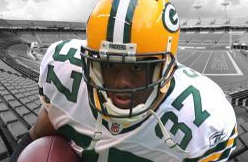ARLINGTON, Tex. — Like anyone trying to learn a new vocabulary, Green Bay cornerback Sam Shields was lost. He could not make sense of his assignments, which was not a surprise considering he played only one year on defense in college and the Packers employ a kaleidoscope 3-4 scheme.
In desperation, Joe Whitt, Shields’s position coach with the Packers, resorted to a tried-and-true teaching tool. He made flash cards, drawing an offensive formation on the front and Shields’s assignment on the flip side.
“It really helped me out,” Shields said Tuesday. “I kept looking it over and over. You get it in your head mentally.”
Shields seared his image into the psyches of Chicago Bears fans in the N.F.C. championship game. He contributed four tackles, a sack and two interceptions, the second of which came with under a minute remaining, as the Packers claimed a 21-14 victory over the Bears and a berth in Super Bowl XLV against the Pittsburgh Steelers.
There are perhaps no stranger N.F.L. penthouse cohabitants than Shields, an undrafted free agent who is gracing his sport’s biggest game as a rookie, and the Packers’ defensive coordinator, Dom Capers, a former coach for the Panthers and the Texans who is breaking his Super Bowl maiden in his 25th season in the league.
“I can’t believe I’m here,” Shields said during media day at Cowboys Stadium.
He was wearing a wispy mustache and a wide smile. This is the first year he has participated in a title game, Shields said, since his Pop Warner flag football days in Florida.
“I’m feeling nervous,” he said, “but the nerves will go away and then it’s going to be time for football.”
His teammates awarded Shields, 23, a game ball in Chicago after he became the first rookie in N.F.L. history with two interceptions and a sack in a playoff contest. But before he could send the Bears into hibernation and Green Bay into delirium, he had to learn how to study film and absorb defensive game plans.
Shields was used to looking at football from the other side. His first three years at the University of Miami, he played receiver. He made 37 catches as a freshman — and 38 in the next two years, after which he was switched to defense to afford him more playing time while taking best advantage of his quickness.
“Switching late probably messed some things up,” Shields said, referring to his career arc, “but I can’t control that.”
His arrest less than two months before the 2010 draft for misdemeanor possession of marijuana did not help his status. The charge was dropped after Shields paid court costs, but the damage was done to his reputation.
“There was a lot of things going on,” Shields said, declining to elaborate.
He said he expected to be drafted “maybe in the last round.” When he was not, he added, “I came in with a chip on my shoulder.”
Shields signed with Green Bay for a $7,500 bonus and a minimum contract.
“My mind-set was making the team on special teams,” he said.
In his secondary education, Shields struggled with a demanding teacher. “I couldn’t get nothing,” Shields said. “I didn’t know nothing. It was kind of hard for me.” He added, “Joe was on me tough.”
Whitt was on Shields like black on a bruise, to the point that the veteran cornerback Charles Woodson interceded. Shields recalled Woodson asking Whitt to ease up on him a little.
That was when Whitt broke out the flash cards, and with tutoring from Woodson, Shields proved a fast study. He has earned regular playing time in the nickel package and is No. 2 on the depth chart behind Woodson, the 2009 defensive player of the year and a seven-time All-Pro selection.
To defend a receiver, it helps to have been one. “Just knowing the route combinations,” he said, adding, “Little things like that.”
The Steelers have one of the fastest receivers in Mike Wallace, and at the mention of his name, Shields’s smile grew luminous.
“I’m a fast guy and he’s a fast guy,” Shields said. “It’s going to be a big challenge, and I can’t wait.”
There is no secret to his success, he said.
“It was dealing with the veteran guys and the coaches who have helped me,” he said. “It’s also studying and staying late so I can try and get it down so I’m ready to play.”

(nytimes.com)



